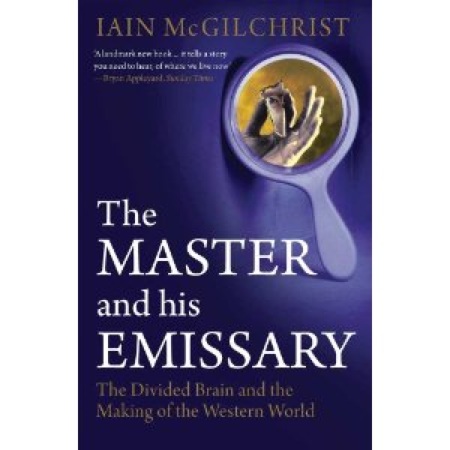

The Divided Brain and the Making of the Western World
Iain McGilchrist (published by Yale University Press 2009)
How to introduce this eminent psychiatrist (who also has degrees in Theology and Philosophy and English Literature) to those who may not have heard about the gripping book he has written? How to convey the illuminating insights it offers and its width of cultural reference? Personally I particularly valued the introduction to Heidegger, the aptly selected quotations from poetry and the analysis of certain works of art-but this is incidental. The main thesis is that our society is suffering from the consequences of the dominance of the left hemisphere of the brain, losing touch with its natural regulative master, the right.
The book is divided into two parts, the first gives a history of the structural development of the brain and reviews clinical findings that have identifed the differences between the right and left hemispheres and how they function. Gradually research has revealed that the left hemisphere sees things abstracted from context, broken into parts from which it reconstructs a whole, while the right sees things whole, in their context and has the potential for empathy and emotional understanding, in the author’s words, ‘a capacity for allowing things to be present to us in all their embodied particularity’. The right hemisphere is congenial to ambiguity and the union of opposites where the left hemisphere cannot afford to be.
Hence two different types of attention, the left hemisphere offering a narrow, precise focus and the right, an attention that is more broad, open and receptive. Reality changes according to the attention we pay to it: an invitation to ponder Blake ‘s saying, ‘A fool sees not the same tree that a wise man sees ‘. The two hemispheres have complementary but conflicting tasks to fulfil, at the same time they need to co-operate. While the left can process information, the right is needed for understanding. For imagination and to reason fully both hemispheres are needed. In a lecture which Iain McGilchrist gave at the RSA: http://www.youtube.com/watch?v=SbUHxC4wiWk. He concludes with a quotation from Einstein : “The intuitive mind is a sacred gift and the rational mind is a faithful servant. We have created a society that honours the servant and has forgotten the gift”.
It is Part Two that I find even more exciting: a survey of evidence of the two different types of brain activity traced in the history of Western culture. It illustrates a succession of shifts of balance between the hemispheres beginning with the pre- Socratic philosophers and the contrasting approaches of Plato and Aristotle. There is much that is surprising and perhaps contentious in this analysis. It was however with delight that I followed his insights into successive epochs from the Renaissance, through to the Modern and Post Modern eras. What is fascinating is the breadth and detail of his research which culminates in a description of a world in which the left brain predominates, recognisable as that in which we are now living. He quotes commentators who have typified it as a society which is increasingly mechanistic and fragmented, marked by an insouciant optimism mixed with paranoia: phenomena that characterise schizophrenia, reflected in the culture at large. As we see from the media, an underlying sense of boredom gives rise to the associated demand for stimulation through sensationalism, and ‘the shock of the novel’. For a taste of Iain McGilchrist’s observations on this, conveyed in a very relaxed manner, one can go to the video of a talk he gave at Shumacher College,Dartington: http://www.youtube.com/watch?v=oXiHStLfjP0&feature=related.
I experience a certain zeal in recommending this important book, it is a warning that corroborates things one has instinctively felt and is impressive in the way it presents a synthesis of knowledge from so many different spheres.
Lesley Croome
For a more recent review see The Divided Brain by Felix Dux